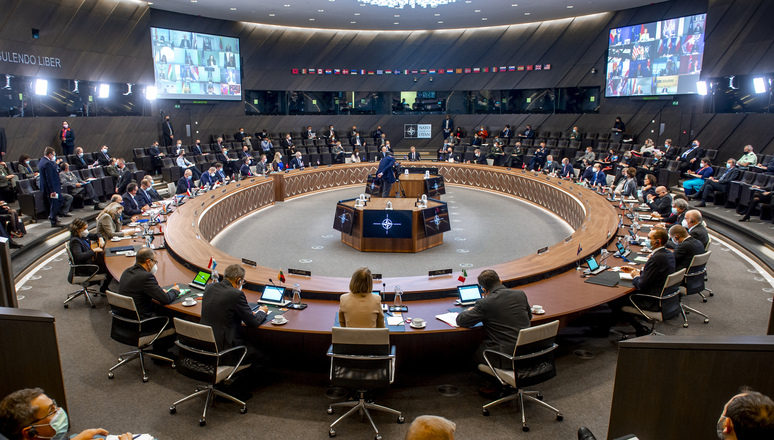Emerging from a virtual meeting with allied foreign ministers, NATO Secretary-General Jens Stoltenberg declared ahead of a meeting with Russia that NATO’s open-door policy is sacrosanct. He also detailed the reasons why NATO believes new conflict in Europe is imminent.
“The risk of conflict is real,” Stoltenberg told members of the media Jan. 7 after a meeting to discuss Russia’s troop buildup on the border of Ukraine, which is believed to number some 100,000 with growing military capabilities.
Russian President Vladimir Putin has said NATO is a threat to Russia’s national security and that expanding eastward by admitting Ukraine and Georgia would only further heighten that concern. The treaty alliance, in turn, claims it is defensive in nature. It provides that any nation may pursue admittance, though all member nations must agree.
Russian and U.S. officials are set to meet in Geneva Jan. 9-10, followed by meetings of the NATO-Russia Council on Jan. 12 and the Organization for Security and Cooperation in Europe (OSCE) on Jan. 13, to discuss Ukraine border tensions and to hear Moscow’s concerns about the alliance. The NATO-Russia meeting is the first since the summer of 2019.
“Russia’s unprovoked and unjustified military buildup in and around Ukraine” has serious implications for European security and stability, the secretary-general said. He said Russian forces are only strengthening a noose around Ukraine.
“The Russian military buildup has not stopped. It continues and [is] gradually building up with more forces, more capabilities,” Stoltenberg said, describing armored units, artillery, combat-ready troops, electronic warfare equipment, and other military capabilities.
Avoiding ‘Second-Class NATO Members’
Stoltenberg was clear that the alliance would not heed Russia’s demand to withdraw the invitation for Ukraine and Georgia to join NATO—or for any country to pursue the path of its choosing.
“There’s no way NATO can compromise on the principle of the right of every nation to choose his own path, and that was very clearly stated by allies today,” Stoltenberg said, citing the NATO founding charter and the Helsinki Final Act of 1975. The act, signed by 35 European countries including the Soviet Union, plus the United States and Canada after two years of negotiations, was a non-binding set of articles that included respect for territorial integrity and refraining from the threat of use of force.
Stoltenberg said Russia’s military buildup, rhetoric, and recent history of invading Ukraine and Georgia made the possibility of new conflict in Europe serious but that NATO would not give into Russian demands. Among Putin’s recent demands has been that former Soviet member states or Warsaw Pact members who are not already in NATO not be allowed to join; and that NATO troops and capabilities in eastern flank countries be withdrawn.
Stoltenberg said that would create “second-class NATO members” devoid of the same defense and deterrence capabilities. There were other areas where compromise could be made with Russia, however, but only on equal footing.
“Balanced, verifiable arms control, yes. One-sided demands on NATO, no,” Stoltenberg said.
Ahead of the meetings with Russia, a Ukrainian defense official told Air Force Magazine the United States and NATO should hold their ground with Putin.
“There should not be any compromise with Russia,” the official said. “They recognize only force. Weakness will provoke them.”
The official also underscored the open-door policy that led to Ukraine’s invitation to join NATO at the Bucharest summit in 2008.
“NATO must show that doors are open and promises kept,” the official said, adding that no decision has been made to provide air and missile defense systems to Ukraine following the December visit of an American air defense team to Ukraine.
While Putin has sought to stymie the growth of NATO, create divisions within the alliance, and weaken defense and deterrence on the eastern flank, Stoltenberg said only the opposite have happened and that peace and democracy in Europe have benefited.
“The enlargement of NATO and the European Union has really helped, over the last decades, to spread and to strengthen democracy and freedom in Europe,” Stoltenberg said.
Following the 2014 Russian invasion of Ukraine, NATO reinforced the eastern flank, tripling the size of the NATO Response Force to 40,000 troops, adding air policing and battle groups, and increasing its presence in the Black Sea region. If Russia were to move on Ukraine, NATO would only further strengthen its position in the East, Stoltenberg said:
“We have significant capabilities, we have troops, we have forces, we have the readiness, we have the plans, to be able to defend and protect all allies.”
